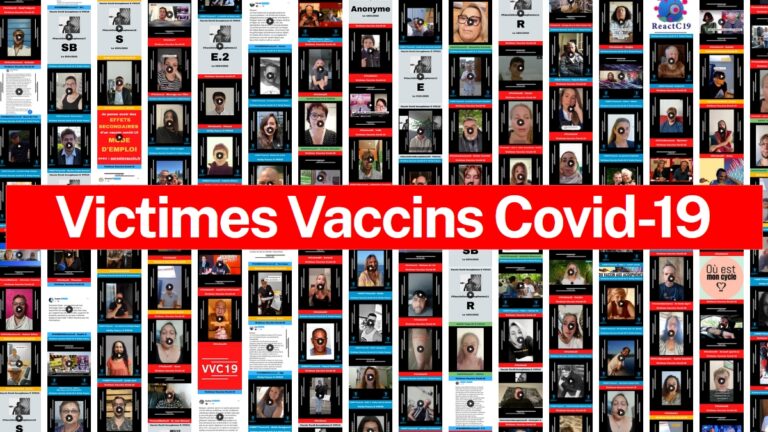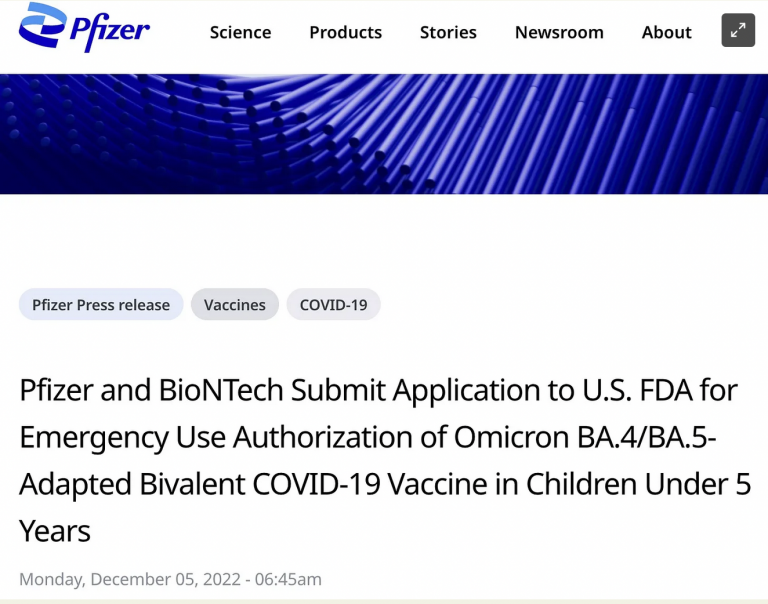Group of Experts Send Open Letter to UK’s Joint Committee on Vaccination and Immunisation
‘Until all these short- and long-term safety concerns have been rigorously investigated and ruled out, and a significant need and benefit for the vaccine in this cohort has been demonstrated, the precautionary principle and fundamental ethical principles of science and medicine must preclude any further administration to healthy children.’
In light of the UK Medical and Healthcare Regulatory Agency (MHRA) authorizing the Pfizer Covid-19 vaccine for infants, a UK organisation comprised of a group of highly qualified UK doctors, scientists, economists, psychologists and other academic experts, the Health Advisory & Recovery Team (HART) sent an open letter to the Joint Committee on Vaccination and Immunisation (JCVI), dated 6th December 2022.
The letter, signed by over 100 Professors, Doctors and healthcare professionals, detailed serious concerns and urged the JCVI not to introduce any Covid-19 vaccines for the 6 months – 5 years age group and also against the possibility of introducing Covid-19 vaccines into the routine children’s immunisation programme.
Dear Professor Shen,
Re: Covid-19 vaccines for 6 months-5 years
We understand that Moderna has applied for an extension of its CMA down to infancy, following agreement by the European Medicines Agency(personal FOI[i]), but are also shocked to learn today that Pfizer has been granted authorization for the infant formulation.
We are writing to urge you not to introduce any Covid-19 vaccines for this age-group and also against the possibility of introducing Covid-19 vaccines into the routine children’s immunisation programme, for the following reasons, many of which have already been shared with the FDA[ii]:
Firstly, as for other paediatric age-groups, the risk from SARS-CoV-2 infection is extremely low[iii], with only 6 deaths in England in the 1-4s age group from Covid-19 in the whole of 2020 and 2021. Most infected toddlers remained asymptomatic or with trivial upper respiratory symptoms, even prior to the arrival of the much milder omicron variants. This alone makes it incomprehensible as to why any medical body would decide that a vaccine would be indicated[iv].
Secondly, it is clear that the currently available vaccines have a very poor efficacy over time. For adults, this lack of durable efficacy[v] has resulted in the need to recommend ongoing boosters, given every few months, with efficacy apparently reducing further for each new variant. This was largely predictable, since these are not sterilising vaccines, and provide no upper airway immunity, necessary to provide effective immunity against respiratory viruses. Vaccine efficacy also wanes more quickly after the paediatric dose (which is lower than the adult dose), with negative efficacy in 5-11s within only 6 weeks of the second dose of Pfizer[vi]. This weakness and brevity of protection negates any notion that adults will be protected by the vaccination of children. Adults will be better protected if children have natural infection, thereby deriving longer-lasting and broader, immunity.
Thirdly. it is well established that young children have a much more effective innate immune system than adults, (see here[vii], here[viii] and here[ix]) Moreover, at this point the vast majority of under 5-year-olds have already been immunologically exposed to SARS-CoV-2 repeatedly, whether or not actively infected.[x] Meeting these viruses early in life will allow protective immunity to develop for the decades ahead. A degree of immune imprinting has been recognised with the adult vaccines, rendering vaccine escape inevitable. Observed alterations in IgG responses with repeated doses have unknown implications for the developing immune system.[xi] Due to the lack of long-term data, concerns about antibody dependant enhancement (ADE) remain unanswered, making this an unacceptable future risk for children.[xii]
Fourthly, the safety profile of the novel, gene-based mRNA vaccines is very far from perfect. The balance of benefit and risk, used to support the rollout of mRNA vaccines to the elderly and vulnerable in 2021, is inappropriate and inapplicable for healthy children in 2022, especially given the negligible hazard that the virus poses to them. In adults, adverse event reports in all official safety surveillance systems, eg VAERS, Yellow Card and EudraVigilance, have reached unprecedented levels, with the VAERS reporting systems showing reported fatalities after Covid-19 vaccines several-fold higher than any previous vaccine.[xiii] Reports of myocarditis in adolescents have been shrugged off as ‘mild and settle quickly’, despite reports to the contrary.[xiv] No evidence is available to support the confident assertion that the inevitable heart tissue scarring resulting from myocarditis, will not lead to serious heart problems and dysfunction 5-10 years down the line. Indeed, Pfizer and Moderna are only now embarking on 5-year follow-up studies[xv] which should have been required from the outset. Adverse event reports in the US, where vaccination has already begun in the pre-school age-group, have tragically included 11 deaths in this cohort to date,[xvi] likely to be an underestimate. There is evidence of a complex functional reprogramming of the innate immune response[xvii] and [xviii]. Most concerning for a children’s vaccine, is the total lack of any long-term safety data to rule out any unexpected negative impact on long-term health or fertility, which should make it unethical to even consider administration to healthy children.
Fifthly, these novel-technology gene products were given an exemption from standard reproductive toxicity, genotoxicity and carcinogenicity animal studies before being rolled out to humans, and indeed have not even had published biodistribution and pharmacokinetic studies.[xix] The manufacturers have provided no data on how much spike protein is produced by different people and for how long – this is of great concern as the dose of and duration of exposure to the spike protein may differ by orders of magnitude between individuals, resulting in huge variance in individual susceptibility to adverse events and harm. The initial claim that the vaccine would remain at the injection site is also, clearly, totally without foundation[xx], which raises the concern that the mRNA lipid nanoparticles or the subsequently produced spike protein may cross the blood-brain barrier or placenta, resulting in inflammation and cell destruction in the brain or fetus by the host immune system? Also of concern, published studies have clearly shown that these products negatively affect T-cell function, and hence the ability of the body to fight not only infections but also to clear cancerous cells[xxi]. At this point, there is far too much evidence of harm to multiple systems and organs to ignore and we have an ethical duty of care to protect our healthy children from iatrogenic harm.
Finally, the research basis for the toddler vaccines was woefully inadequate[xxii]. For Moderna follow-up was for a median of 70 days after the second dose; this is contrary to international guidelines which recommend at least one year follow-up.[xxiii] Efficacy was estimated at only 37% for 2-4-year-olds, bringing it far below what is usually considered an acceptable efficacy to justify use of a vaccine, and in the younger group prevention of asymptomatic infection at a mere 3.8% with confidence intervals from -111 to +53% should have made this vaccine a complete non-starter for this cohort. The use of ‘Immunobridging’ (presence of an antibody response) was relied upon as a proxy for preventing symptomatic disease and gives no real-world data to ascertain true effectiveness. Local and systemic side effects were common, especially after the second dose, with post-vaccine fever more common in those with previous SARS-CoV-2 infection. Shockingly, several severe adverse events including a case of Type 1 diabetes, a lifelong, life-limiting disease, were hidden in the supplementary appendix[xxiv], which brings into question the transparency of the data.
The Pfizer trial[xxv] for this age-group was even more chaotic, with the trial originally planned for only two doses, which then turned out not to produce a decent antibody response, but by then many of the placebo children had been vaccinated, requiring new recruits to act as controls for a third dose. The efficacy studies were based on immunobridging. Even antibody testing, however, showed reduced efficacy against omicron variants. Clinical infections occurred after the third dose in only 10 children whether active or placebo, nine of whom had been seronegative at trial entry, the 10th with unknown status. Thus, there were no clinical cases in children who already had naturally-acquired immunity. “Seven cases in participants 2-4 years of age met the criteria for severe COVID-19: 6 in the BNT162b2 group, of which 2 cases occurred post unblinding, and 1 in the placebo group.” This hardly suggests efficacy, it could even represent ADE. Twelve children had multiple episodes: all were vaccinated. As for safety, “the median duration of blinded follow-up for participants 6-23 months of age after Dose 3 was 35 days”.
There has been a stated concern from public health bodies about a general increase in vaccine hesitancy. Rolling out a rushed pharmaceutical product with known short-term risks and unknown long-term risks, to an age group that cannot benefit in any meaningful way, can only fuel public doubt in the scientific rigour of the authorisation process. This could undermine the entire childhood immunisation programme and lead to further vaccine hesitancy. It can already be seen in the US that uptake for this young age is extremely low – parents are voting with their feet. It is hard to believe that authorising let alone recommending vaccines with such a poor track record, could do anything other than further increase scepticism of all vaccines.
Until all these short- and long-term safety concerns have been rigorously investigated and ruled out, and a significant need and benefit for the vaccine in this cohort has been demonstrated, the precautionary principle and fundamental ethical principles of science and medicine must preclude any further administration to healthy children.
Dr Rosamond Jones, MBBS, MD, FRCPCH, retired consultant paediatrician
Originally published by HART. Please visit their page an Open Letter to the JCVI to read more.
Suggest a correction







